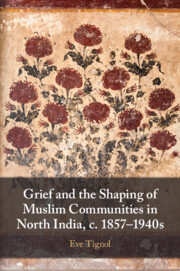
- Publisher:
- Cambridge University Press
- Online publication date:
- March 2023
- Print publication year:
- 2023
- Online ISBN:
- 9781009297684
- Subjects:
- Literature, Area Studies, Asian Literature, South Asian History, Asian Studies, History

Drawing on approaches from the history of emotions, Eve Tignol investigates how they were collectively cultivated and debated for the shaping of Muslim community identity and for political mobilisation in north India in the wake of the Uprising of 1857 until the 1940s. Utilising a rich corpus of Urdu sources evoking the past, including newspapers, colonial records, pamphlets, novels, letters, essays and poetry, she explores the ways in which writing took on a particular significance for Muslim elites in North India during this period. Uncovering different episodes in the history of British India as vignettes, she highlights a multiplicity of emotional styles and of memory works, and their controversial nature. The book demonstrates the significance of grief as a proactive tool in creating solidarities and deepens our understanding of the dynamics behind collective action in colonial north India.
‘A remarkable study of political aesthetics, Eve Tignol's book reveals the shifting world of affect and emotion within which Muslim identity was reformulated in colonial India. It represents a real achievement.’
Faisal Devji - University of Oxford
‘Eve Tignol’s theoretically sophisticated and beautifully laid out monograph is both an intellectual and an aesthetic feast. She explores the many shapes grief went through between 1857 and the 1940s, weaving together questions from the history of emotions and emotional practices with a close reading of poetry, showing a rare sensibility to language.’
Margrit Pernau - Max Planck Institute for Human Development
‘This book has become one of the few works in English - very few on South Asia - which deal with themes related to emotions in history, a fairly recent development in our understanding of history. Notions of nostalgia, memory, melancholia, humiliation, and similar themes, have only recently been analysed in South Asian contexts in English by historians, although there is a huge literature in Urdu - in poetry, prose, around Karbala alone - which has been doing so. Such work is a welcome addition to the ever widening ways we look at the past. Eve Tignol’s excellent and extensive bibliography also leads all of us to new and different paths.’
S. Akbar Zaidi Source: Bloomsbury Pakistan
 Loading metrics...
Loading metrics...
* Views captured on Cambridge Core between #date#. This data will be updated every 24 hours.
Usage data cannot currently be displayed.